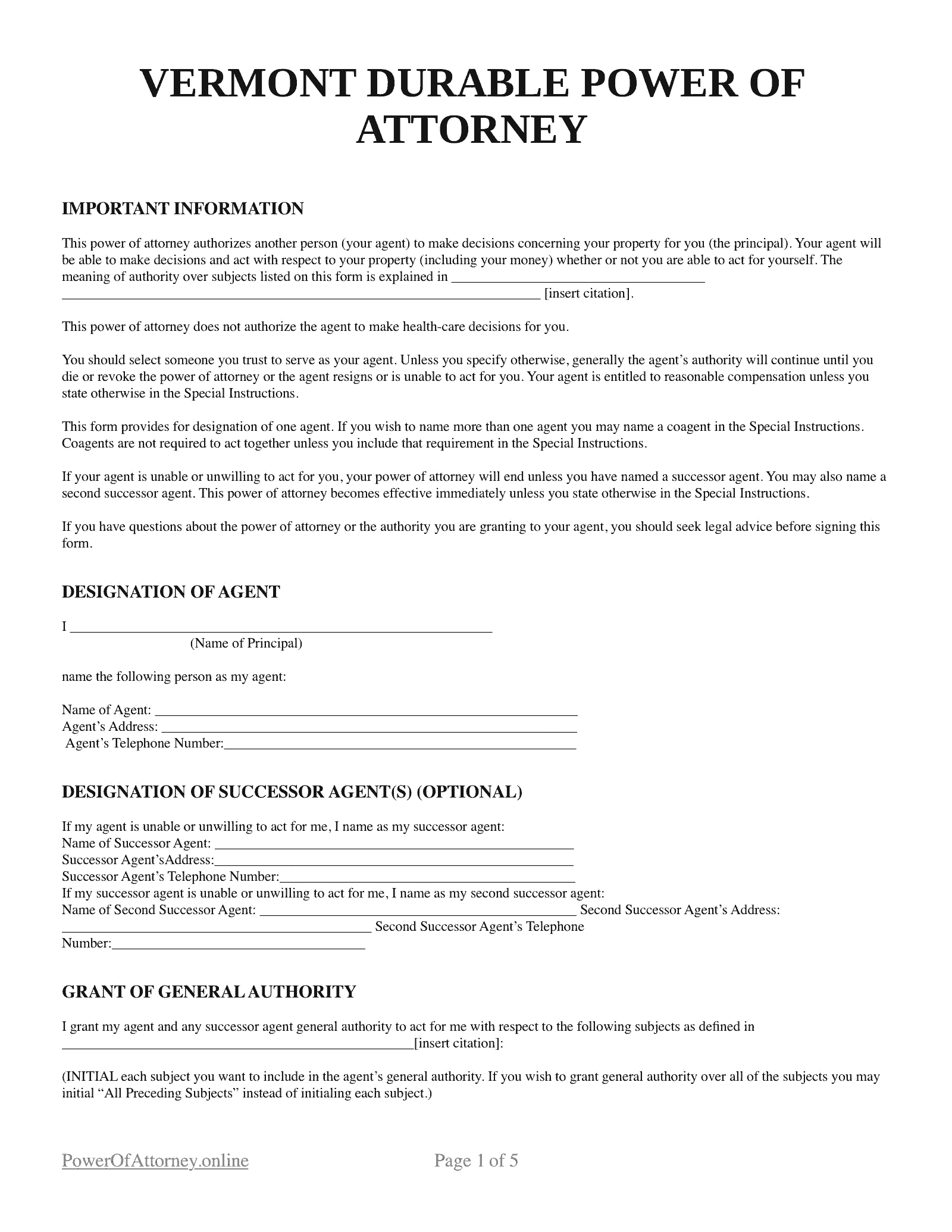Free Vermont Durable Power of Attorney Forms
A power of attorney (POA) is a legal document that allows a person, referred to as an agent, to decide on various legal and financial matters on behalf of another person, known as the principal. In most cases, the document’s authority expires when the person becomes incapacitated.
If a person is legally declared mentally incompetent, it could put businesses at risk or affect personal matters. To prevent any issues, you must enforce a durable POA, which allows your agent to continue deciding on your behalf despite incapacity.
Here is everything you need to know about the Vermont durable POA forms.

Vermont Durable Power of Attorney Laws
- Definition - The Vermont statutes define a durable POA as “a written power of attorney in which the authority of the agent does not terminate in the event of the disability or incapacity of the principal” (14 V.S.A. § 3501).
- Durability - State law describes Vermont POAs as durable by nature. If the document contains statements similar to: “This power of attorney shall not be affected by the subsequent disability or incapacity of the principal,” the authority granted remains in effect even if the principal is declared mentally incapacitated (14 V.S.A. § 3508).
- Signing Requirement- To become legally binding, the POA must be signed by the principal in front of at least one witness. The notary public and witness must be different people (14 V.S.A. § 3503).
Signing Requirements in Vermont
The POA must be signed and dated by the principal. The form must also be notarized and signed by at least two witnesses who are at least 18 years old. In case the principal is unable to sign the document, they can appoint someone else to sign on their behalf as long as there is expressed consent.
How To Write a Durable POA in Vermont
The durable POA acts as written permission for the agent to decide on business, financial, and other legal matters on behalf of the principal, even after incapacity. Here are the steps in making one:
1. Choose an agent
Selecting an agent is the most crucial step when writing a durable POA in Vermont. Choose an agent you trust with your business, finances, and other important matters.
Most principals choose a family member to become their agent. It could be their spouse, child, sibling, or parent. Other principals appoint business partners or lawyers as agents.
2. Discuss your wishes with your agent
While everything can be written down on the form, it is still important to personally discuss matters with your agent. Inform them about what you want them to do now and when the time comes that you are no longer mentally healthy.
Discuss compensation with your agent. It is the agent’s right to receive compensation for their responsibilities. In many cases, the agent may refuse compensation because they are close to the principal. However, it is a discussion worth having because their tasks often take time and effort. Carrying them out could take them away from their work and other obligations.
The agent may also ask for allowances (lodging, transportation, and food) in exchange for performing their tasks.
3. Download the printable Vermont Durable POA Form
For convenience, download a durable POA form online. Make sure you download a template from Vermont because different states have different requirements. Fill out the form and include all the necessary details. While the agent will be making decisions, they should still be based on what the principal wants.
4. Sign the Durable POA Form in Vermont
Review the content of the durable POA form in Vermont. Once it’s complete and you’re satisfied with it, sign it. Don’t forget to include the date when you signed it. It will be considered legal in Vermont once it has been notarized and signed by two witnesses.
5. Use the Durable POA Form in Vermont
The form can now be used in various financial, legal, and business transactions, even if you are still able to negotiate them yourself. If your agent will be transacting for you, they need to bring the document every time they act on your behalf.
Legal entities will ask for the document to ensure the agent is authorized to make certain transactions for you. Note that the document cannot be used for healthcare decisions as there is another type of POA for them.